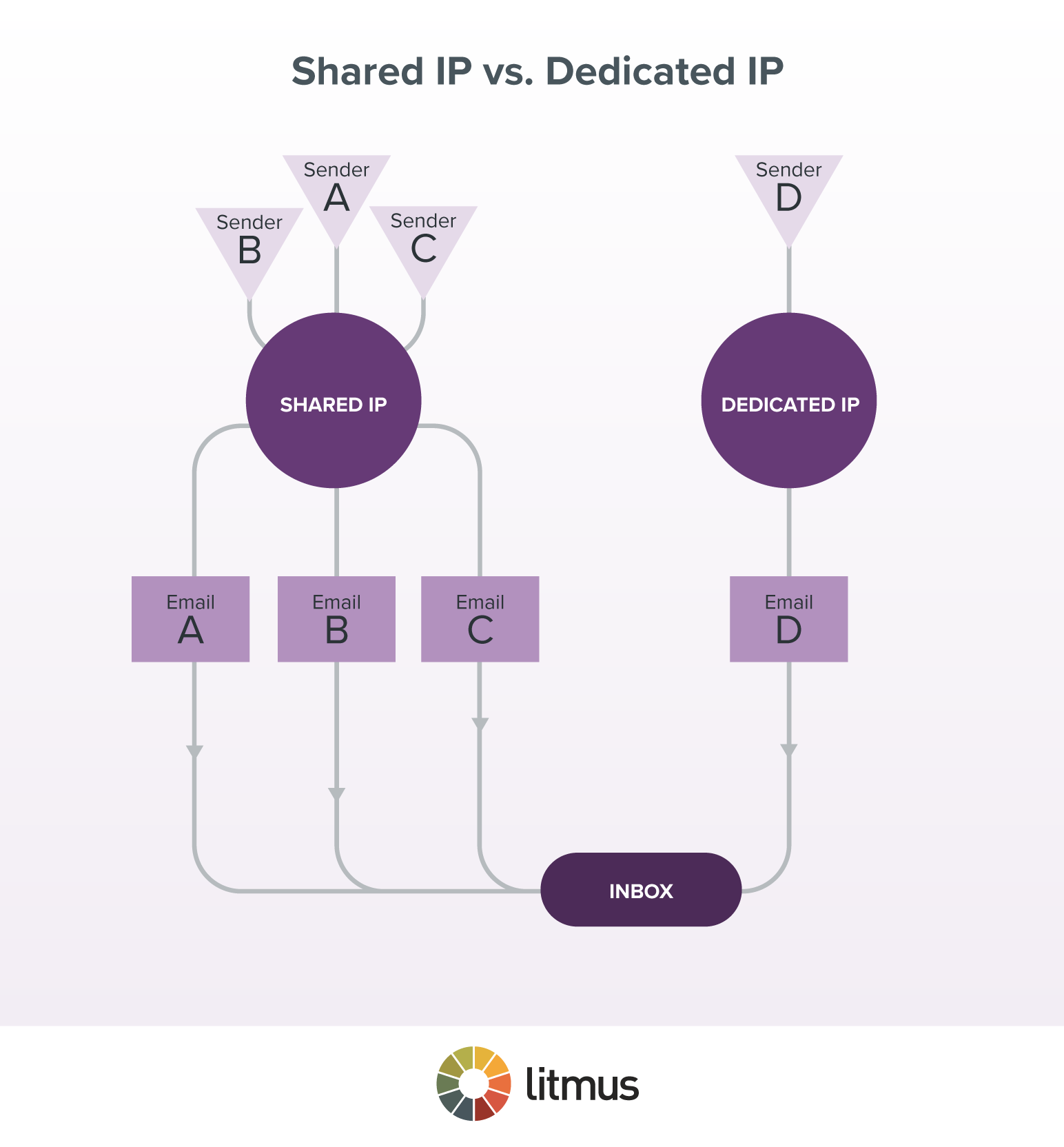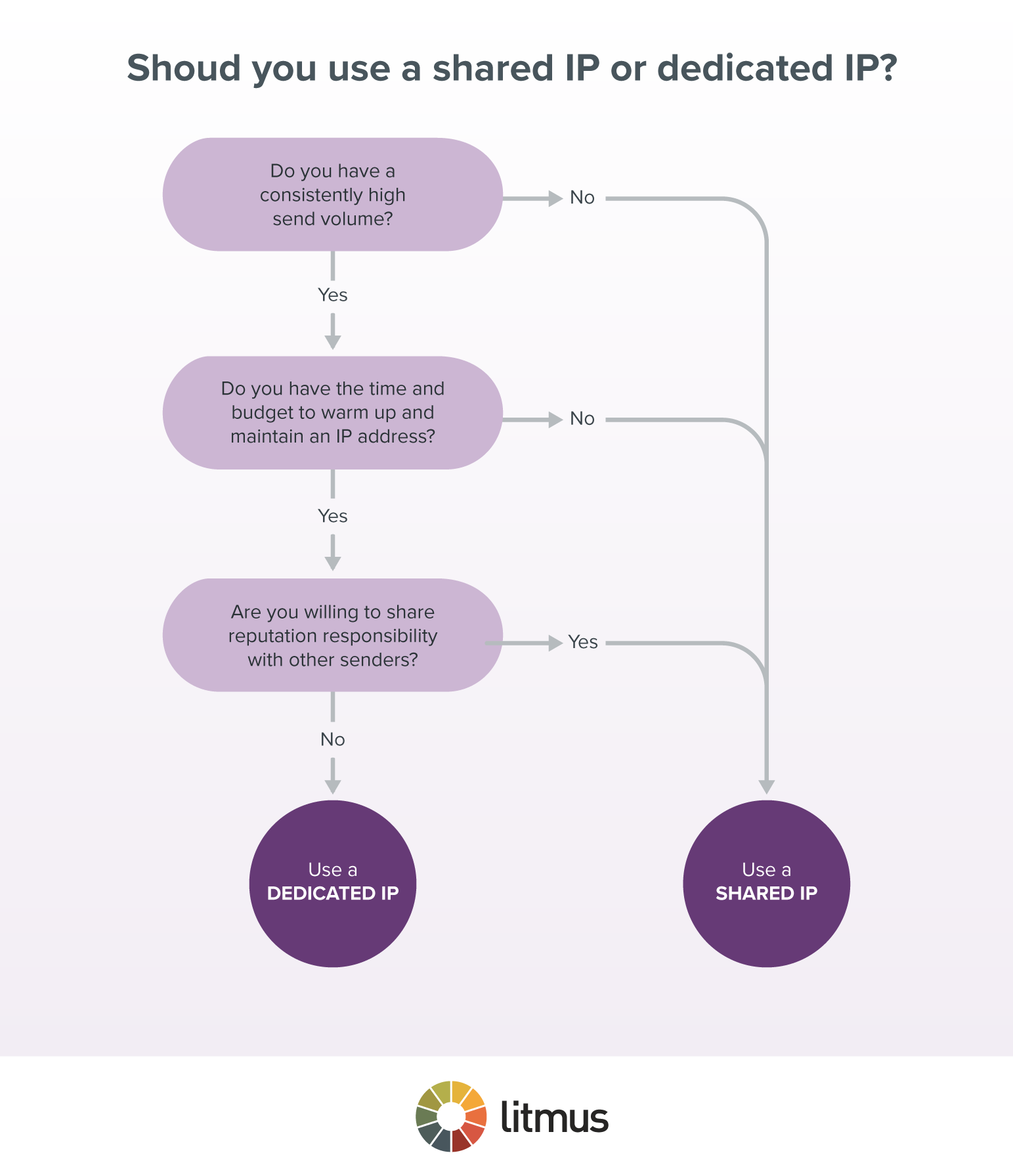Dedicated vs. Shared IP: Which is Right For Your Emails?
Email marketing decisions are rarely cut and dry. You can follow best practices, but each team and brand has its own limits, preferences, and considerations.
So when it’s time to decide between dedicated IPs vs. shared IPs, you have to consider a few different factors.
Read on to learn what a dedicated IP is and when you should have one so you can make the best decision for your email program.
What is an IP address?
An IP address is a website’s version of a street address. The string of numbers identifies a website’s location, although we tend to use the more human-friendly website address for our navigation.
For example, the IP address for www.litmus.com is currently 23.185.0.4.
Every website has an IP address, and your emails are routed through one, too. Each time you send an email, inbox service providers check the sending IP address as one of the factors they use to ensure you are who you say you are.
As a result, your IP address reputation affects your deliverability. That will be a recurring theme in this post. There are two types of email IP addresses: a shared IP or a dedicated IP.
With a shared IP, your email sends from one of many IPs that your email service provider (ESP) manages. All of the companies using that ESP will cycle through the same IP addresses. So, someone else is likely using your assigned IP address(es), too.
With a dedicated IP, your email always sends from the same static IP, and your company is the only resident at that address.
 | Switching ESPs? There’s more to moving ESPs than noodling on shared vs. dedicated IPs. Learn how to audit your current provider, get buy-in for the move, make your decision, coordinate the migration, and analyze the ROI. |
The benefits (and drawbacks) of a dedicated IP
At first glance, a dedicated IP looks like an enticing option to ensure you have total control over your IP reputation. While that’s true, it’s only part of the story. Here’s what you need to know about using a dedicated email IP address.
Pro: Other company’s shady email practices won’t affect your deliverability
The benefit of dedicated IPs that you’ll hear most often is protecting your deliverability from other senders’ practices. Since you’re the only company sending email from an IP address, you have total transparency and control over maintaining IP reputation, and as an extension, your deliverability.
Con: The full weight of your IP reputation lies on your shoulders
You need to maintain excellent sending practices on a dedicated IP address because your actions alone determine IP reputation. In the same way that sharing the IP address with shady senders can bring your reputation down, sharing an address with reputable senders can boost your program.
Without other reliable senders on the IP to act as a crutch, you may feel the effects of sender errors more fully.
Pro: Your IP address is more likely to get “safelisted”
If you’re the only company sending email from an IP address, and you’ve proven reliable in the past, organizations may safelist you. This is particularly helpful for B2B companies that need to send transactional and promotional emails to employees within a company.
Con: You need to warm up the IP address (and keep it warm)
You start from scratch with a dedicated IP, which means you need to warm up your IP address to establish a solid foundation for your reputation. And once warmed, your dedicated IP needs to stay consistently warm. Any sudden dips or spikes in email volume will put internet service providers (ISPs) like Yahoo! and Verizon Media on red alert—and you’ll get dinged for that.
Con: Dedicated IPs require more time and money
Typically, dedicated IPs cost more than using your ESP’s shared IP pool. Dedicated IPs are helpful for high-volume senders (more on that later), so they may only be a choice on higher-tiered plans.
Dedicated IP vs. Shared IP: how to choose the best option for your team
As you can see, there’s a lot more to dedicated IPs than controlling reputation and deliverability. To help you decide which IP setup you should choose (and whether your current one is right for you), we’ve created a decision chart with key factors to consider.
Shared IPs
Sending from a shared IP is a popular choice that works for a wide range of email teams. This setup is often more affordable and easier to manage than a dedicated IP address. ESPs also want to maintain a positive IP reputation (or their customers would be upset), so most have methods to manage sender standards. You can check your email IP address reputation if you’re unsure of where you currently stand. It’s also helpful to remember that IP reputation is only one component that impacts deliverability.
Dedicated IPs
On the other hand, a dedicated email IP address could be a good fit for your team if:
You have a monthly send volume of 100,000 emails or more.
If you consistently have a high send volume, a dedicated IP will give you more control over your reputation. If your send volume has fluctuations, though, a shared IP will be better to smooth out send volume and prevent raising any deliverability red flags.
You’re willing to pay for and maintain a dedicated IP address.
You’re the sole manager of a dedicated IP address, so you should expect more work and investment than a shared IP address that’s pre-warmed and managed by your ESP.
You want to be the sole influence on your IP reputation.
If you have rock-solid sending practices and want to take full responsibility for your reputation, then you may be ready for a dedicated IP.
Keep your email deliverability in tip-top shape
Whether you choose a shared or dedicated IP, it’s important to monitor your deliverability, since IP reputation is just one piece of the puzzle. Do you use a shared or dedicated IP address? What factors helped you decide which to choose? Comment down below!
 | Make it to the inbox—not the junk folder Identify issues that may land your emails in the spam folder—with contextual advice to fix deliverability problems before you send. |

Steph Knapp
Steph Knapp is a Freelance Content Writer for SaaS and B2B companies


